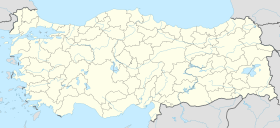Gargara
| Γάργαρα | |
| Location | Ayvacık, Çanakkale Province, Turkey |
|---|---|
| Region | Troad |
| Coordinates | 39°35′10″N 26°32′3″E / 39.58611°N 26.53417°ECoordinates: 39°35′10″N 26°32′3″E / 39.58611°N 26.53417°E |
| Type | Settlement |
| History | |
| Founded | 6th century BCE |
| Abandoned | No sooner than the 9th century CE, possibly as late as the 14th |
| Periods | Archaic Greece to Byzantine Empire |
Gargara (Ancient Greek: Γάργαρα) was an ancient Greek city on the southern coast of the Troad region of Anatolia. It was initially located beneath Mount Gargaron, one of the three peaks of Mount Ida, today known as Koca Kaya (39°35′10″N 26°32′03″E / 39.58611°N 26.53417°E). At some point in the 4th century BCE the settlement moved approximately 5.8 km south of Koca Kaya to a site on the small coastal plain near the modern villages of and (39°32′22″N 26°32′46″E / 39.53944°N 26.54611°E), at which point the previous site came to be known as Old Gargara (Ancient Greek: Παλαιγάργαρος). Both sites are located in the Ayvacık district of Çanakkale Province in Turkey.
Mount Gargaron has been identified with the mountain today called Koca Kaya (Turkish Great Rock), a western spur of Mount Ida with a maximum elevation of 780 m. The poet Epicharmus (fl. 540 - 450 BCE) refers to the mountain as "snowcapped" (ἀγάννιφα), and the Etymologicum Magnum (ca. 1150 CE) knew a tradition according to which the inhabitants of Old Gargara moved to their new site to escape the cold of their old home. In Homer's Iliad it is said to have had an altar to Zeus at its summit, and hence is a place the god frequently visits. In one passage Zeus is said to have come to Mount Gargaron from Mount Olympos to view the battle between the Trojans and the Acahaeans, about 50 km NE of here. In writers of the 1st and 2nd century AD such as Statius and Lucian Zeus is said to have abducted the Trojan prince Ganymede from Mount Gargaron while he was hunting in the nearby forests. Lucian also represents the Judgement of Paris as taking place on Mount Gargaron rather than in its more traditional location further to the east above Antandrus. The anonymous author of On Rivers thought that Gargara was Mount Ida's previous name, while the Latin poet Valerius Flaccus used it as a learned way of referring to Ida. The Etymologicum Magnum explains the name of Gargaron either as deriving from the verb γαργαρίζειν ('to gargle') on account of the springs thought to bubble up on the summit (an inference taken from Homer's reference to 'many-fountained Ida' in conjunction with Gargaron), or as deriving from γαργαρέων ('uvula') on account of the mountain's shape.
...
Wikipedia

